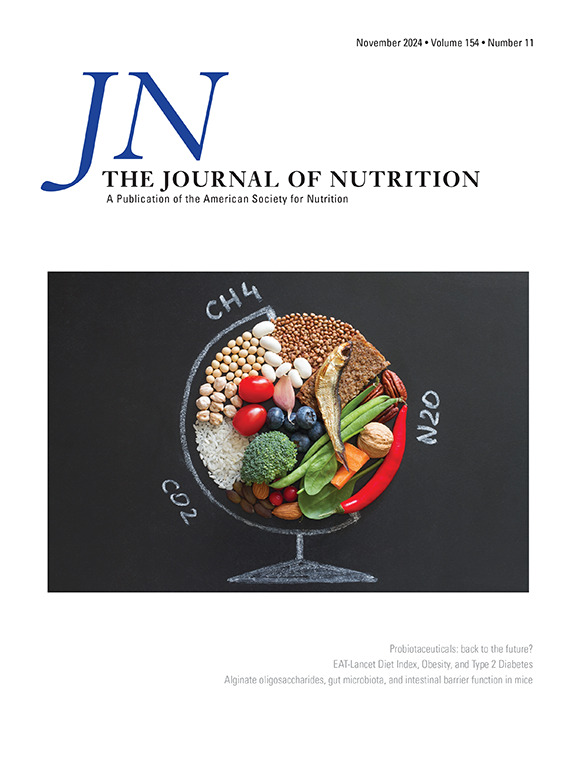在健康的中年女性中,从提供完全、互补或不完全必需氨基酸的食物中摄入等量总蛋白质的膳食不会对 24 小时骨骼肌蛋白质合成产生不同程度的影响。
IF 3.7
3区 医学
Q2 NUTRITION & DIETETICS
引用次数: 0
摘要
背景:膳食蛋白质质量可通过刺激骨骼肌蛋白质合成(MPS)来评估。关于摄入不同蛋白质质量的等氮膳食如何影响餐后和 24 小时 MPS 的知识有限:我们评估了蛋白质质量和互补蛋白对 MPS 的影响。我们假设,含有适量优质全蛋白的膳食会刺激餐后和 24 小时 MPS。含有两种互补的植物性不完全蛋白质的膳食对 MPS 的刺激较小,而每餐都含有植物性不完全蛋白质但在 24 小时内互补的膳食不会刺激 MPS:这项准实验研究包括一个评估蛋白质质量的随机交叉设计和一个非随机低蛋白对照组。我们测量了健康中年女性(9 人,年龄 56±4 岁)对三种饮食条件的餐后和 24 小时 MPS 反应:每餐含 23 克蛋白质的等氮膳食,这些蛋白质来自:i)完全蛋白质(瘦牛肉);ii)两种不完全但互补的蛋白质来源(海军/黑豆和全麦面包);iii)单一不完全蛋白质来源(黑豆或全麦面包),但在 24 小时内提供完整的氨基酸谱。在低蛋白组中,女性(n=8,54 ± 5 岁)早餐只摄入 5 克蛋白质。在持续输注 L-[环-13C6]苯丙氨酸的过程中采集静脉血和阔筋膜样本,以测量混合肌肉分数合成率(FSR):结果:早餐后(p=0.90)或 24 小时后(p=0.38),含有完全蛋白质、补充蛋白质或不完全蛋白质的膳食对 FSR 反应没有不同程度的影响。早餐时,与低蛋白对照餐相比,完全蛋白餐(p=0.030)和互补蛋白餐(p=0.031),但不完全蛋白餐(p=0.38)的FSR反应更大:结论:从提供完全、互补或不完全必需氨基酸的食物中摄入适量总蛋白质的等氮膳食不会在餐后和每日不同程度地刺激肌肉蛋白质合成:该临床试验在 clinicaltrials.gov 登记为 NCT03816579。URL:; https://www.Clinicaltrials: gov/ct2/show/NCT03816579?term=NCT03816579&draw=2&rank=1。本文章由计算机程序翻译,如有差异,请以英文原文为准。
Meals Containing Equivalent Total Protein from Foods Providing Complete, Complementary, or Incomplete Essential Amino Acid Profiles do not Differentially Affect 24-h Skeletal Muscle Protein Synthesis in Healthy, Middle-Aged Women
Background
Dietary protein quality can be assessed by skeletal muscle protein synthesis (MPS) stimulation. Limited knowledge exists on how consuming isonitrogenous meals with varied protein qualities affects postprandial and 24-h MPS.
Objectives
We assessed the effects of protein quality and complementary proteins on MPS. We hypothesized that meals containing a moderate amount of high-quality, complete protein would stimulate postprandial and 24-h MPS. Meals containing two complementary, plant-based incomplete proteins would stimulate MPS less, and meals containing plant-based incomplete proteins at each meal, but complementary over 24 h would not stimulate MPS.
Methods
This quasi-experimental study included a randomized, crossover design to assess protein quality and a nonrandomized low-protein control. We measured postprandial and 24-h MPS responses of healthy middle-aged women (n = 9, age 56 ± 4 y), to 3 dietary conditions: isonitrogenous meals containing 23 g protein/meal from 1) complete protein (lean beef), 2) 2 incomplete, but complementary protein sources (navy/black beans and whole wheat bread), and 3) single incomplete protein sources (black beans or whole wheat bread at 1 meal), but providing a complete amino acid profile over 24 h. In the low-protein group women (n = 8, 54 ± 5 y) consumed a single breakfast meal containing 5 g of protein. Venous blood and vastus lateralis samples were obtained during primed, constant infusions of L-[ring-13C6]phenylalanine to measure mixed muscle fractional synthetic rates (FSR).
Results
Meals containing complete, complementary, or incomplete proteins did not differentially influence FSR responses after breakfast (P = 0.90) or 24 h (P = 0.38). At breakfast, the complete (P = 0.030) and complementary (P = 0.031) protein meals, but not the incomplete protein meal (P = 0.38), had greater FSR responses compared with the low-protein control meal.
Conclusions
Isonitrogenous meals containing a moderate serving of total protein from foods providing complete, complementary, or incomplete essential amino acid profiles do not differentially stimulate muscle protein synthesis after a meal and daily.
Trial registration number
This clinical trial was registered at clinicaltrials.gov as NCT03816579.
URL
https://www.clinicaltrials.gov/ct2/show/NCT03816579?term=NCT03816579&draw=2&rank=1.
求助全文
通过发布文献求助,成功后即可免费获取论文全文。
去求助
来源期刊

Journal of Nutrition
医学-营养学
CiteScore
7.60
自引率
4.80%
发文量
260
审稿时长
39 days
期刊介绍:
The Journal of Nutrition (JN/J Nutr) publishes peer-reviewed original research papers covering all aspects of experimental nutrition in humans and other animal species; special articles such as reviews and biographies of prominent nutrition scientists; and issues, opinions, and commentaries on controversial issues in nutrition. Supplements are frequently published to provide extended discussion of topics of special interest.
 求助内容:
求助内容: 应助结果提醒方式:
应助结果提醒方式:


